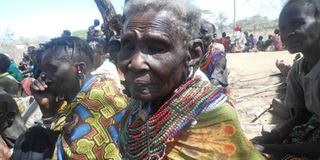Governors say famine situation in 24 Asal counties worrying

Hungry Pokot residents wait for relief food. Now governors from 24 counties in the arid and semi-arid lands (Asal) have said the famine situation is worsening as a result of persistent drought. They want the national government and donors to act quickly to avert possible loss of life. PHOTO | WYCLIFF KIPSANG
What you need to know:
- The governors want quick intervention by the national government and donors.
- The worst hit counties are Mandera, Wajir, Garissa, Turkana, Baringo and Marsabit.
- Mandera Governor Ali Roba said the frequency and amount of relief food has been inadequate to deal with the situation
- Drought places a heavy strain on the national economy.
The Council of Governors has raised alarm over the famine ravaging 24 counties in the arid and semi-arid areas.
Speaking on behalf of the counties, Mandera Governor Ali Roba who is the chairman of the 24 arid and semi-arid lands (Asal) counties called for quick intervention by the national government and donors to avert loss of human lives and livestock.
“The drought situation has severely affected the 24 counties. The worst hit counties are Mandera, Wajir, Garissa, Turkana, Baringo and Marsabit,” Mr Roba told the Nation in an interview Wednesday.
Famine relief supplies falls under Devolution Cabinet Secretary Anne Waiguru’s docket and the National Drought Management Authority of Kenya.
Mr Roba said the county governments have been doing water tracking since November 2013 to avert the famine due persistent failure of rain in the areas.
SITUATION WORSENING
“But the situation is worsening with the number of those in need of relief supplies increasing on daily basis,” he said.
“The water tracking has been carried out entirely by county governments. Although the national government has helped by sending relief food, the frequency and amount of food has been inadequate to deal with the situation,” Mr Roba said.
He regretted that the relief supplies from the national government were still being channelled national government officers at the county level saying this made it difficult to verify if they were benefitting the counties.
The governor said although the counties had done a lot by distributing their own relief rations since 2013, the prolonged drought due to failure of the long rains was overburdening the devolved units.
“Apart from carrying out massive water tracking, livestock disease control and relief food supplies have also become too much for the counties and that is why we want the national government to come up in big way to take care of the distribution of the rations,” Mr Roba said.
QUICK RESPONSE NEEDED
He said county governments would not want a repeat of the past situations when the national government and donor agencies waited until people were malnourished or dead and livestock wiped out before intervening.
“We want quick response to save lives. We want national government and donors to respond in a timely manner and reach out to populations in counties effectively. As county governments we will also do our best,” Mr Roba said.
In Mandera County alone, Mr Roba said, 450,000 households were affected by the ravaging drought and were in dire need of relief supplies.
“The situation is also serious in Turkana with the numbers of those affected increasing by the day. We can’t afford to wait until people and livestock die to act,” he said.
He said 152 water tracking centres had been put up in Mandera by the county government.
“It is a very expensive project at a time when we are also conducting livestock disease control,” he added.
In Turkana County, thousands of people are already starving. Rivers and wells dried up in 2013 while livestock have perished and crops failed.
As well as the suffering and loss it inflicts on communities, drought places a heavy strain on the national economy.





